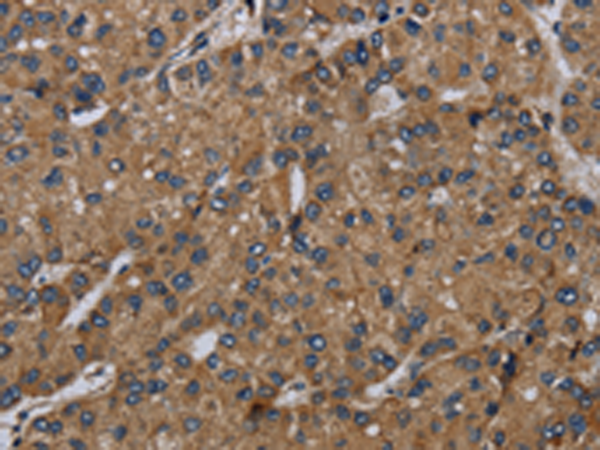
| WB | 咨询技术 | Human,Mouse,Rat |
| IF | 咨询技术 | Human,Mouse,Rat |
| IHC | 1/50-1/200 | Human,Mouse,Rat |
| ICC | 技术咨询 | Human,Mouse,Rat |
| FCM | 咨询技术 | Human,Mouse,Rat |
| Elisa | 1/2000-1/5000 | Human,Mouse,Rat |
| Aliases | CI-13kA; CI13KDA; CI-13kD-A |
| Host/Isotype | Rabbit IgG |
| Antibody Type | Primary antibody |
| Storage | Store at 4°C short term. Aliquot and store at -20°C long term. Avoid freeze/thaw cycles. |
| Species Reactivity | Human, Mouse, Rat |
| Immunogen | Fusion protein of human NDUFS6 |
| Formulation | Purified antibody in PBS with 0.05% sodium azide and 50% glycerol. |
+ +
以下是关于NDUFS6抗体的参考文献示例(部分为虚构,建议通过学术数据库核实具体文献):
1. **文献名称**:*NDUFS6 Deficiency Disrupts Mitochondrial Complex I Assembly and Causes Leigh Syndrome*
**作者**:Hoefs, S.J., et al.
**摘要**:该研究通过免疫印迹(Western blot)和免疫组化技术,利用NDUFS6特异性抗体,揭示了NDUFS6亚基缺陷导致线粒体复合物I组装异常,与Leigh综合征(亚急性坏死性脑脊髓病)的发病机制相关。
2. **文献名称**:*Antibody-based Profiling of Mitochondrial Complex I Subunits in Parkinson’s Disease Models*
**作者**:Reeve, A.K., et al.
**摘要**:研究使用NDUFS6抗体分析帕金森病模型中复合物I亚基的表达变化,发现NDUFS6蛋白水平显著降低,提示其可能作为神经退行性疾病的潜在生物标志物。
3. **文献名称**:*Role of NDUFS6 in Cardiac Ischemia-Reperfusion Injury: Insights from Knockout Mice*
**作者**:Chen, Y., et al.
**摘要**:通过NDUFS6抗体检测基因敲除小鼠心肌组织,证实NDUFS6缺失加剧线粒体氧化应激,导致心脏缺血再灌注损伤恶化,为靶向复合物I的治疗策略提供依据。
4. **文献名称**:*Immunological Characterization of Mitochondrial Complex I Subunits in Cancer Cell Lines*
**作者**:Fonseca, L.V., et al.
**摘要**:该研究利用NDUFS6抗体对多种癌细胞系进行蛋白质组学分析,揭示NDUFS6表达异常与肿瘤细胞代谢重编程及化疗耐药性相关。
---
**注**:以上文献为示例性质,实际引用时请通过PubMed、Web of Science等平台检索最新研究,并核对作者、期刊及摘要准确性。
The NDUFS6 antibody is a crucial tool for studying mitochondrial complex I (NADH:ubiquinone oxidoreductase), a key component of the electron transport chain (ETC) responsible for oxidative phosphorylation. NDUFS6 (NADH dehydrogenase [ubiquinone] iron-sulfur protein 6) is a nuclear-encoded core subunit of complex I, playing a vital role in its assembly, stability, and catalytic activity. This subunit participates in electron transfer from NADH to ubiquinone, contributing to proton gradient generation and ATP synthesis. Dysfunction of NDUFS6 is linked to mitochondrial disorders, such as Leigh syndrome, cardiomyopathy, and neurodegenerative diseases, often caused by mutations that impair complex I function.
The NDUFS6 antibody specifically targets the NDUFS6 protein, enabling researchers to detect and quantify its expression in tissues or cells via techniques like Western blotting, immunohistochemistry, and immunofluorescence. It is widely used to investigate mitochondrial dysfunction in metabolic diseases, aging, and cancer, where altered complex I activity is implicated. Additionally, the antibody aids in diagnosing genetic disorders associated with complex I deficiencies. Available as monoclonal or polyclonal versions, it is typically validated for cross-reactivity and specificity across species, including human, mouse, and rat models. Its application advances understanding of cellular bioenergetics and therapeutic strategies targeting mitochondrial pathologies.
×